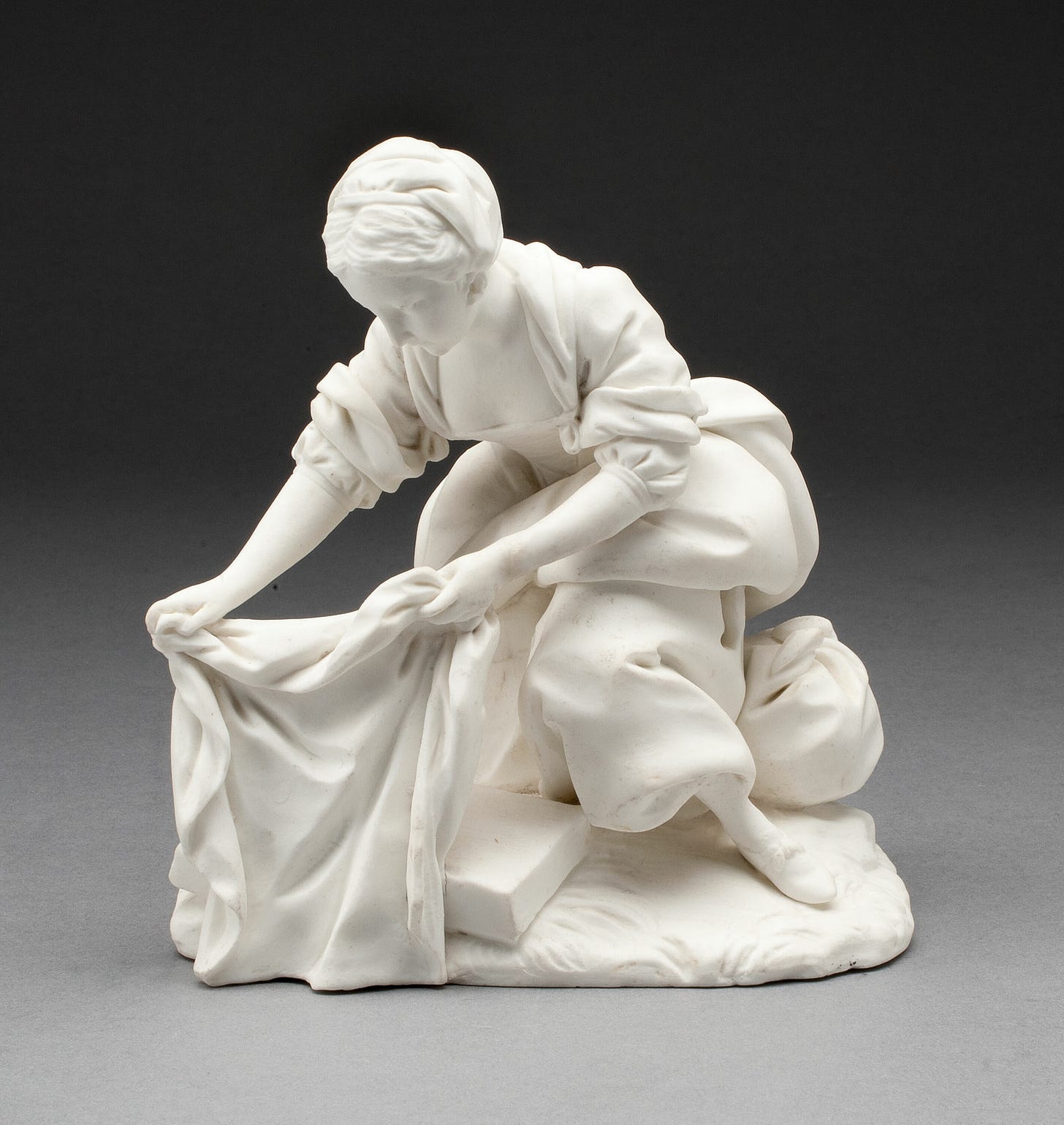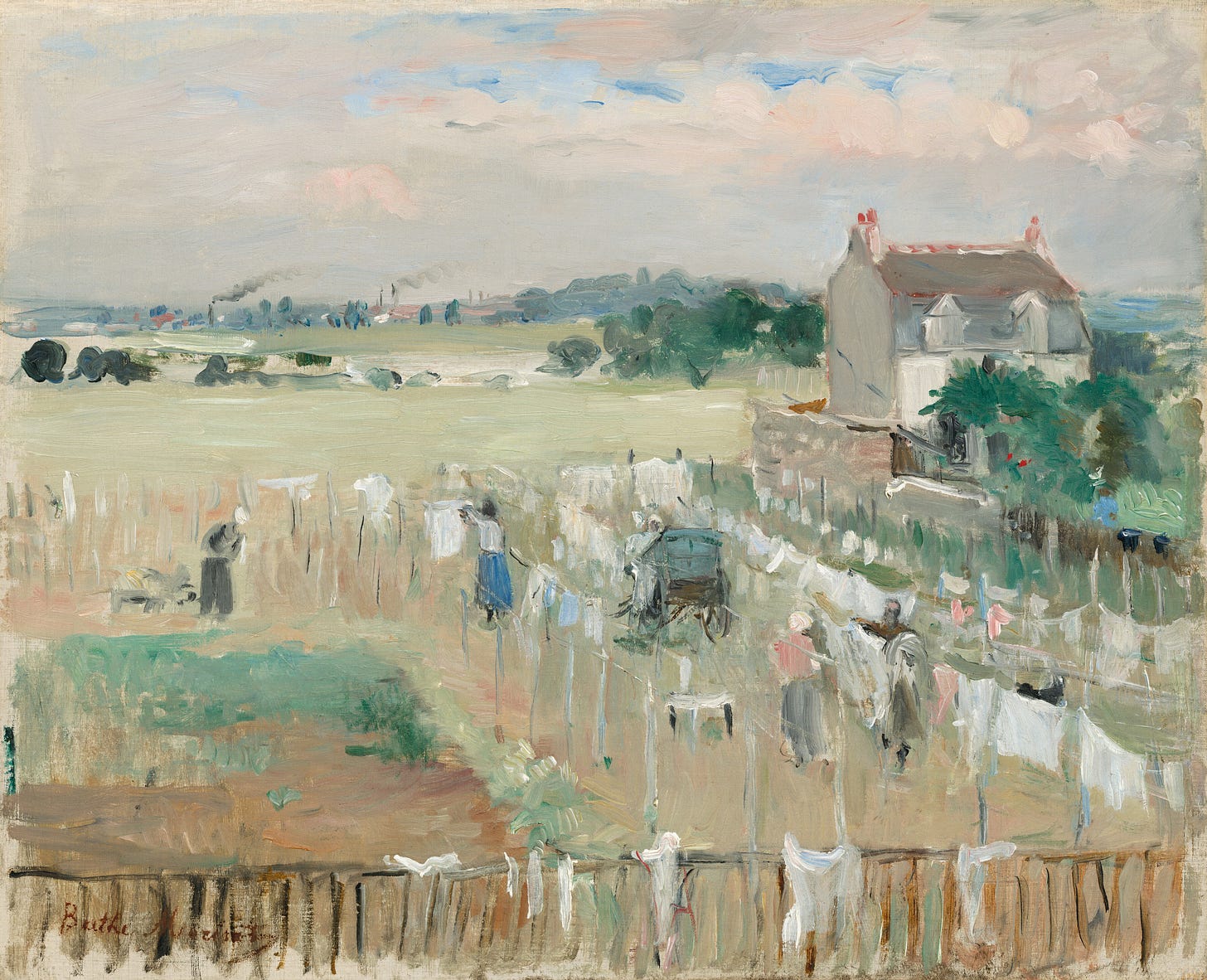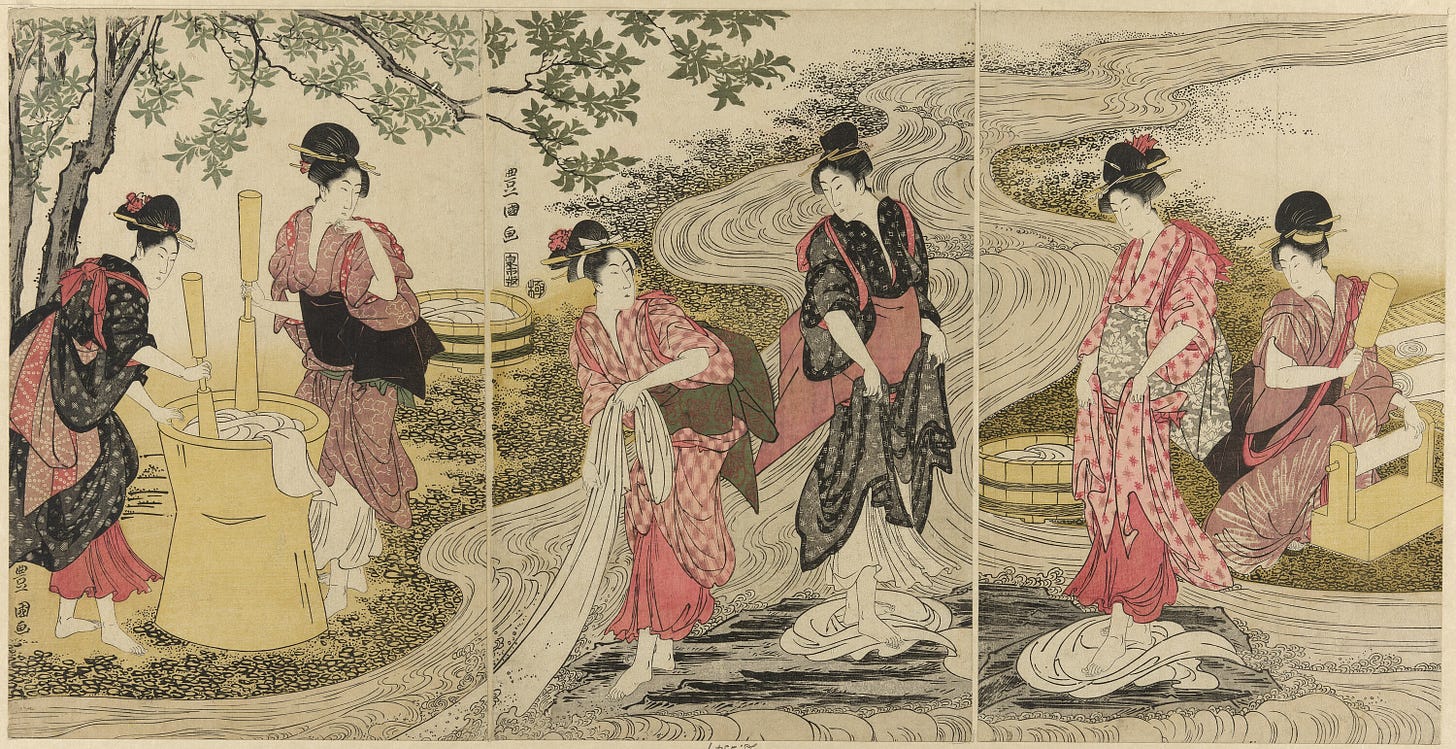Hi,
I just wanted to pop into your inboxes with three poems on happiness and my thoughts on washing clothes.
Notes made on a washing stone
Washing clothes is an important part of who I am. When laundry piles up, I feel the weight of it on my shoulders. Literally. It physically hurts for me to see the weather take a sudden turn on a good laundry day. Rainy weather, if it lasts for more than week, becomes an unwelcome guest. I want sunshine for my clothes, thanks.

At the sight of an empty laundry basket, my heart does a double flip and I try to maintain the good mood for the rest of the day, if I can.
When my mother was a young girl, growing up in a one-room flat in a government housing colony, she was the self-assigned in-charge of laundry in her house. On many occasions she has told me how she’d wake up at 4 am every morning to bring water from the public hand-pump a few metres away from her block to wash clothes. This was the only help she did around the house and she was quite proud of it.
When I was about 10 or 11 years old, I have a distinct memory of my grandfather coming to me with a wrinkled saree off the clothes line. '“Let me see you fold it,” he said. I was going to be evaluated. My entire ability, the person that I was and the person I was to become were all going to be tested. I wanted to impress my grandfather who was following my movements with the silence and alertness of a Shaolin master…
The vigour for doing the laundry, I’m sure you now understand, has been passed on. A bar of soap handed down to me like a baton. The satisfaction I take in washing and folding clothes is possibly an inheritance.
Doing the laundry is not a simple (washing) machine task. It involves tender care (naturally dyed, handwoven fabrics must always be washed by hand), keen observation (check for coins or receipts in pockets), forethought (always wring wet clothes before clipping them onto the line. This way, the clothes won’t have wrinkles after they’ve dried) and a bit of creativity (I have a line for the towels, a line for tops, a line for the bottoms and a line for the delicates). I could go on but I’ll stop because I don’t want to come off as extreme :)

But I’ve often wondered about my fixation with this mundane task. True, it has been foisted upon women by a very patriarchal society and is regressive to feminist thinking. But it does give me a sense of fulfilment. If you want me to get analytical about it, I could say it’s conditioning. However, it is also possible for someone to like doing the laundry.
From my careful collection of thoughts on the topic from friends and acquaintances, I would like to categorise people into two groups - ones who almost feel the same way about laundry as I do (I’ll allow those with somewhat less passion as well, it’s just the thought that counts) and the ones who think that the laundry fairy visits them every night to bless their closet with an inexhaustible supply of bras and panties and boxers.
I get along with both kinds of people just fine. My problem is with my own self, with my compulsive need to wash, wring, dry and fold clothes.
Dirty clothes are calling out to me whenever I sit down to write. They scream the moment I set down my suitcase from a week-long trip. The fact that I found time to do my laundry every single day even when I was on writing or meditation retreats gnaws at me. It shouldn’t be this way, right? Something shouldn’t be so calming and frustrating at the same time.
So I found some comfort when I read Mary Oliver’s thoughts on the topic in her book Upstream. She says that it is important to value the artistic self beyond the ordinary and the someone involved in creative work must by all means know how to fight with the interruptions.
There is a notion that creative people are absent minded, reckless, heedless of social customs and obligations. […] The working, concentrating artist is an adult who refuses interruption from himself, who remains absorbed and energised in and by the work— who is thus responsible to work.
But there is one thing that Mary Oliver hasn’t discussed here. It is the mind-space a routine task can give us. There are certain movements the body can make without too much thinking — like driving or cutting vegetables or doing yoga — and this I think frees up the mind to get into spaces it wants to. It also helps, as Marquez says in one of his interviews, to “overcome fear of reality”. When the task at hand seems daunting, manual labour does help.
The many hours I’ve spent — separating the whites from the colours; waiting for the dryer to release its lock; wringing and arranging clothes on lines to dry; bringing back warm, fresh clothes to be folded and arranged once again into cupboards, in their designated shelves — have given me plenty of time to think.
You must also read this poem by Ruth Stone — Things I Say to Myself While Hanging Laundry. And I completely understand how her thoughts jump from ants crossing on the clothesline to Einstein’s theory of relativity, from clean sheets to the cosmos... Indeed these are things we think to ourselves while hanging the laundry :)

This poem below, is my main inspiration for writing this week’s newsletter on the topic of laundry. I hope you find some meaning in it too :)
A Woman Writer Does Laundry Enough typing. Today I am doing laundry in the old style. I wash, I wash, rinse, wring as did my grandmothers and great-grandmothers. Relaxation. Doing laundry is healthful and useful like a washed shirt. Writing is suspect. Like three interrogation marks typed on a page. — Anna Swir translated from the Polish by Czeslaw Milosz and Leonard Nathan Found on The Gladdest Thing
And here I leave you with three poems that have the word ‘happiness’ in their titles. I love how all three poets give us a version of happiness that is very characteristic to their style.
Happiness
So early it’s still almost dark out.
I’m near the window with coffee,
and the usual early morning stuff
that passes for thought.
When I see the boy and his friend
walking up the road
to deliver the newspaper.
They wear caps and sweaters,
and one boy has a bag over his shoulder.
They are so happy
they aren’t saying anything, these boys.
I think if they could, they would take
each other’s arm.
It’s early in the morning,
and they are doing this thing together.
They come on, slowly.
The sky is taking on light,
though the moon still hangs pale over the water.
Such beauty that for a minute
death and ambition, even love,
doesn’t enter into this.
Happiness. It comes on
unexpectedly. And goes beyond, really,
any early morning talk about it.
— Raymond CarverHappiness
A state you must dare not enter
with hopes of staying,
quicksand in the marshes, and all
the roads leading to a castle
that doesn’t exist.
But there it is, as promised,
with its perfect bridge above
the crocodiles,
and its doors forever open.
— Stephen DunnLingering in Happiness
After rain after many days without rain,
it stays cool, private and cleansed, under the trees,
and the dampness there, married now to gravity,
falls branch to branch, leaf to leaf, down to the ground
where it will disappear-- but not, of course, vanish
except to our eyes. The roots of the oaks will have their share,
and the white threads of the grasses, and the cushion of moss;
a few drops, round as pearls, will enter the mole's tunnel;
and soon so many small stones, buried for a thousand years,
will feel themselves being touched.
- Mary OliverCiao lover,
write to you soon :)



